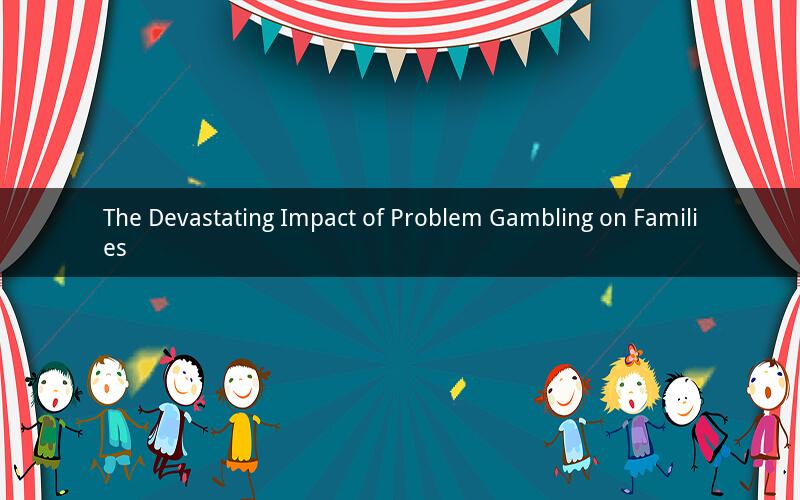
Introduction:
Problem gambling is a complex issue that can have profound effects on individuals, but its impact extends far beyond the gambler. Families often bear the brunt of the consequences, facing emotional turmoil, financial strain, and strained relationships. This article explores how problem gambling affects families, highlighting the various ways in which it disrupts lives and offers insights into coping strategies.
1. Emotional and Psychological Impact:
Problem gambling can cause significant emotional and psychological distress within families. The gambler's addiction often leads to feelings of shame, guilt, and secrecy, which can create a toxic environment. Family members may experience a range of emotions, including anger, frustration, sadness, and despair. This emotional turmoil can strain relationships and lead to increased conflict within the household.
2. Financial Strain:
One of the most immediate consequences of problem gambling is the financial burden it places on families. Gamblers may go to great lengths to fund their addiction, leading to significant debt and financial instability. This can result in missed mortgage payments, unpaid bills, and even foreclosure or eviction. The stress of financial strain can exacerbate emotional difficulties and further deteriorate family dynamics.
3. Relationship Strain:
Problem gambling can have a devastating impact on family relationships. Trust and communication may be compromised as the gambler struggles to hide their addiction and the resulting consequences. Family members may feel betrayed, abandoned, and emotionally drained. This strain can lead to increased conflict, separation, and even divorce.
4. Mental Health Issues:
The emotional and psychological toll of problem gambling can lead to mental health issues within the family. Family members may develop conditions such as depression, anxiety, and post-traumatic stress disorder (PTSD) as a result of living with a problem gambler. Seeking professional help and support is crucial for both the gambler and their loved ones.
5. Coping Strategies:
Dealing with a family member who struggles with problem gambling can be challenging. However, there are various coping strategies that families can employ to navigate this difficult situation:
a. Education: Understanding the nature of problem gambling and its impact on families can help family members develop empathy and compassion for the gambler. Learning about available resources and support groups can also provide valuable information for dealing with the addiction.
b. Setting Boundaries: Establishing clear boundaries and consequences for gambling behavior is essential. This may involve limiting access to gambling opportunities, monitoring financial activities, and seeking legal intervention if necessary.
c. Communication: Open and honest communication is crucial for maintaining healthy family relationships. Encouraging the gambler to seek help and expressing support without enabling their behavior can be challenging but is necessary for long-term recovery.
d. Support: Joining support groups for families affected by problem gambling can provide a sense of community and understanding. Sharing experiences and receiving guidance from others who have faced similar challenges can be incredibly beneficial.
e. Self-Care: Taking care of one's own mental and emotional well-being is vital when dealing with a family member's problem gambling. Seeking therapy, engaging in self-care activities, and maintaining a healthy lifestyle can help family members cope with the stress and trauma.
Frequently Asked Questions:
Q1: Can problem gambling lead to domestic violence?
A1: Yes, problem gambling can contribute to domestic violence. The stress of financial strain, emotional turmoil, and increased conflict within the household can create a volatile environment that may lead to abusive behavior.
Q2: Is it possible for a family to recover from the impact of problem gambling?
A2: Yes, it is possible for families to recover from the impact of problem gambling. With time, support, and effective coping strategies, families can heal and rebuild their lives.
Q3: How can I support a family member who is struggling with problem gambling?
A3: Support your loved one by being empathetic, non-judgmental, and encouraging them to seek professional help. Educate yourself about problem gambling and its impact on families, and offer resources and support groups as needed.
Q4: Can problem gambling affect children?
A4: Yes, problem gambling can have a significant impact on children. They may experience emotional distress, behavioral issues, and academic difficulties as a result of living with a problem gambler.
Q5: What are some warning signs that a family member may be struggling with problem gambling?
A5: Warning signs may include secretiveness about financial matters, sudden changes in behavior or appearance, increased stress levels, and the inability to pay bills or meet financial obligations. If you suspect a family member is struggling with problem gambling, it is important to address the issue and seek help.